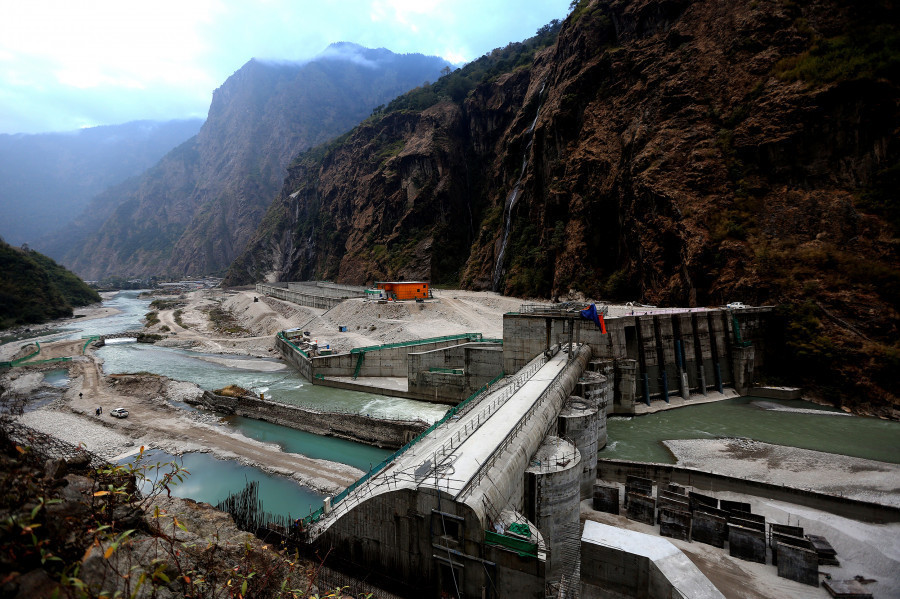National
Calls grow for national treatment in India for Nepal’s hydropower
Indian stakeholders at the power summit want Nepal’s provision of free power and royalties amended.
Prithvi Man Shrestha
Nepali and Indian stakeholders in the power sector on Tuesday asked the Indian government to provide equal treatment to Nepal’s hydropower so as to create a competitive power market in India.
Even though India has granted access to its market to Nepal’s power in the day-ahead market, two policies to promote hydropower generation in India have put Nepal’s hydropower at a competitive disadvantage, according to Nepali officials.
First, a notification issued by India’s Ministry of Power in January 2021, which was modified in July last year, forces distribution companies to buy a certain percentage of hydropower from domestic projects, which does not apply to imported power. This policy is known as Hydropower Purchase Obligation (HPO).
Another is the Indian Power Ministry’s December 2 order to waive Inter-State Transmission System (ISTS) charges on the transmission of electricity generated by new hydropower projects.
The waiver, which was already available to solar and wind power projects, will not be applicable to the hydroelectricity exported by Nepal and result in Nepali power producers losing competitive edge in the Indian power market.
“We have requested in our bilateral meetings that Nepal’s hydropower should also be included in India’s HPO,” Nepal’s Energy Secretary Dinesh Ghimire said while speaking at a discussion session of a two-day power summit that started in Kathmandu on Tuesday. “We are in negotiations [with India] and hopeful of a positive outcome.”
As per the notification, a distribution company must have purchased 0.35 percent of the total power it distributes from hydropower projects in fiscal 2022-23, which should increase to 2.82 percent in fiscal 2029-30 when India aims to add 30,000MW of hydropower capacity through the compliance of this notification.
“Hydropower imported from outside India shall not be considered for meeting Hydropower Purchase Obligation,” the notification said.
Ashish Garg, vice-president of the Independent Power Producers Association of Nepal (IPPAN), told the Post in December last year that Nepal’s hydropower could be sold on a larger scale if India also allowed distribution companies to purchase imported hydropower to meet the HPO requirement.
Nepali officials have also been raising the issue of ISTS waiver for domestic hydropower producers in India that has pushed Nepal’s hydropower at a disadvantage.
Secretary Ghimire said Nepal’s hydropower would complement solar and wind energy supply in India. “India has realised the importance of hydropower and made the HPO mandatory for distribution companies,” he said.
Indian stakeholders also supported Nepal’s position at the discussion.
Bhupendra Kumar Singh, director and head of energy security at the Confederation of Indian Industry (CII), said that the HPO facility should also apply to hydropower from Nepal. “This will be beneficial for both countries and it will help the Indian market to be competitive and benefit the consumers as well,” he said.
He also called for reducing transmission costs for Nepal’s power to make its hydropower more competitive in the Indian market.
While Indian stakeholders supported Nepal’s request for HPO for its hydropower, they also called on Nepal to reconsider the provision of providing free power or royalty to the country.
“The Indian developers being required to provide substantial quantities of free power to Nepal would increase their cost,” said R V Shahi, former power secretary of India.
For example, the SJVN Limited will provide 21.9 percent of energy free of cost to Nepal and over Rs100 billion in royalties. He stressed the need to reconsider this policy, thereby allowing power producers to keep the price low and competitive.
During the interaction, Nepali officials insisted that the country’s hydropower is cheap by South Asian standards.
Besides, Nepali officials called for increased and easier market access to the Indian power market. They called for improvement in the Indian government’s rule on export-import of power from (or to) neighbouring countries.
Nepali officials say the southern neighbour has refused to provide market access to the electricity generated by the 456MW Upper Tamakoshi Hydropower Project as a Chinese contractor was involved in building one of the project’s components.
India restricts import of power generated with involvement of Chinese companies in the neighbouring countries.
New Delhi has so far allowed Nepal to sell 452.6MW of electricity in the Indian market generated by 10 select power projects.
Ravi said India's guidelines on trading of power with neighbouring countries were essentially good. “It is nice to have 95 percent glass full,” he said.
The two-day power summit organised by IPPAN has mostly attracted Indian actors in the power sector while there is also some representation from other countries.
During the interaction, Nepali stakeholders called for access to India’s real time power market and long-term market.




 20.12°C Kathmandu
20.12°C Kathmandu















